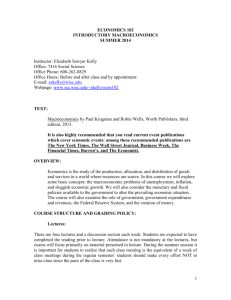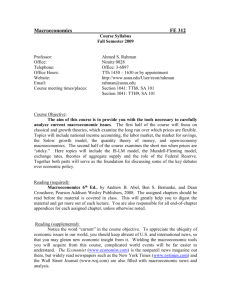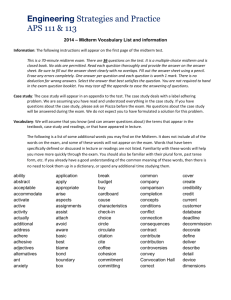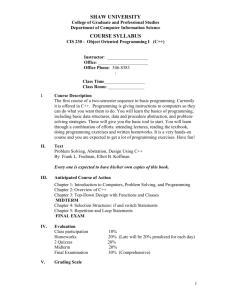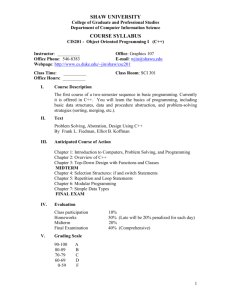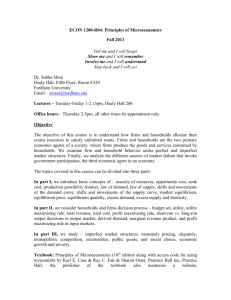reading list
advertisement
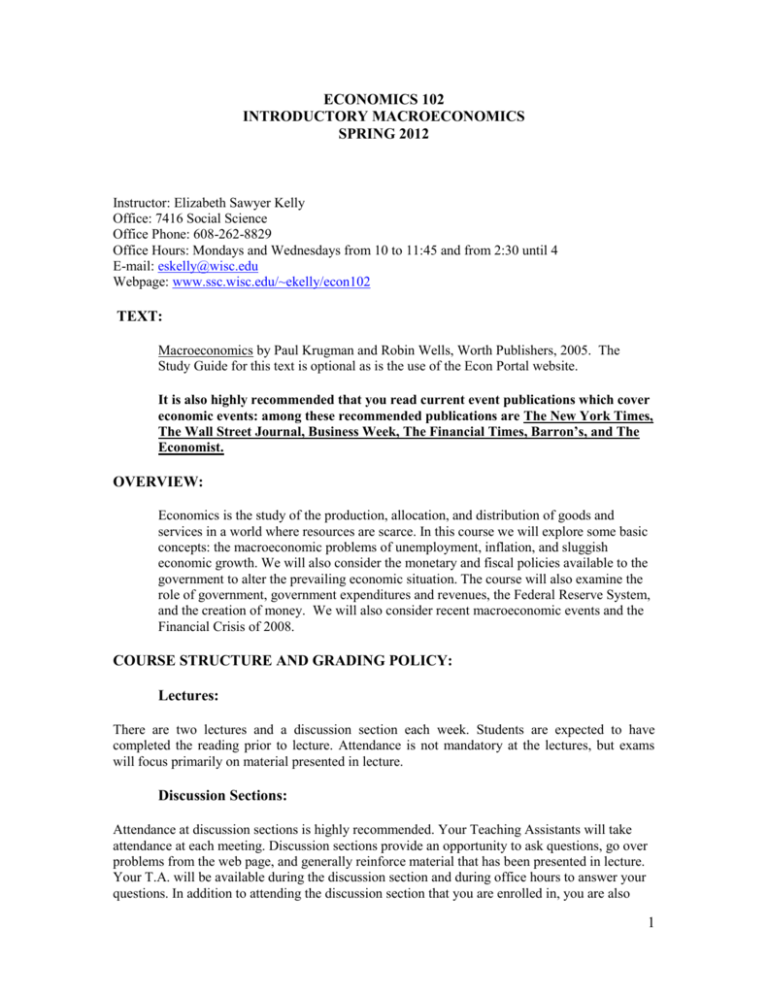
ECONOMICS 102 INTRODUCTORY MACROECONOMICS SPRING 2012 Instructor: Elizabeth Sawyer Kelly Office: 7416 Social Science Office Phone: 608-262-8829 Office Hours: Mondays and Wednesdays from 10 to 11:45 and from 2:30 until 4 E-mail: eskelly@wisc.edu Webpage: www.ssc.wisc.edu/~ekelly/econ102 TEXT: Macroeconomics by Paul Krugman and Robin Wells, Worth Publishers, 2005. The Study Guide for this text is optional as is the use of the Econ Portal website. It is also highly recommended that you read current event publications which cover economic events: among these recommended publications are The New York Times, The Wall Street Journal, Business Week, The Financial Times, Barron’s, and The Economist. OVERVIEW: Economics is the study of the production, allocation, and distribution of goods and services in a world where resources are scarce. In this course we will explore some basic concepts: the macroeconomic problems of unemployment, inflation, and sluggish economic growth. We will also consider the monetary and fiscal policies available to the government to alter the prevailing economic situation. The course will also examine the role of government, government expenditures and revenues, the Federal Reserve System, and the creation of money. We will also consider recent macroeconomic events and the Financial Crisis of 2008. COURSE STRUCTURE AND GRADING POLICY: Lectures: There are two lectures and a discussion section each week. Students are expected to have completed the reading prior to lecture. Attendance is not mandatory at the lectures, but exams will focus primarily on material presented in lecture. Discussion Sections: Attendance at discussion sections is highly recommended. Your Teaching Assistants will take attendance at each meeting. Discussion sections provide an opportunity to ask questions, go over problems from the web page, and generally reinforce material that has been presented in lecture. Your T.A. will be available during the discussion section and during office hours to answer your questions. In addition to attending the discussion section that you are enrolled in, you are also 1 welcome to attend other discussion sections. We will make available a list of all T.A.s, their discussion sections, and the times and locations for these discussion sections. Study Guide: There is an optional study guide available to accompany the textbook. This study guide reviews and reinforces the basic material presented in each chapter. It provides a sound base to build upon for the lecture material. Students that need reinforcement for this material will find it helpful to do the problems in the study guide. Website: There is a course website at www.ssc.wisc.edu/~ekelly/econ102. This website provides a wealth of material: e.g., information about exams, announcements about the class, old practice questions and homeworks (with answers), old exams, and information about TAs. Please take advantage of this website as a study guide. In addition this semester students will have the option to use the Econ Portal which is a website supported by the textbook authors. GRADES: There will be two midterms, five homeworks, and a comprehensive final. The midterms will be on Wednesday, February 22, 2012 and Wednesday, March 28, 2012 The midterms will be held in class: students should plan to arrive ten minutes early on the midterm dates to their assigned classroom in order that the full class hour is available to them for the exam. Students arriving late will not receive compensating time: all exams must be turned in to the proctor at the end of the class hour. Midterms are mandatory: students missing midterms will receive a grade of zero for that exam unless they provide documentation of illness. The midterm exam format will be announced in class prior to the exam. There will be a mandatory comprehensive final exam on Tuesday, May 15 from 7:25 p.m. to 9:25 p.m. The final exam format will be announced in class prior to the exam. 2 The weight of the exams will be First Midterm 25% of grade Second Midterm 25% of grade Final 40% of grade Homeworks 10% of grade All exams are required. Students can anticipate that grades will fall roughly along the following distribution: A: 15% of the class AB: 18% of the class B: 20% of the class BC: 20% of the class C: 18% of the class D and F: 9% of the class LOW GRADES ON MIDTERMS WILL NOT BE DROPPED; ONCE YOU TAKE A TEST THE GRADE YOU RECEIVED STAYS ON YOUR RECORD. THERE IS NO EXTRA CREDIT IN THIS COURSE. THERE WILL BE NO MAKE-UP EXAMS TO REPLACE MIDTERMS THAT HAVE BEEN MISSED. IMPORTANT DATES: 2/8/12 2/15/12 2/22/12 3/14/12 3/21/12 3/28/12 5/9/12 5/15/12 Homework #1 Due in Class Homework #2 Due in Class FIRST MIDTERM IN CLASS Homework #3 Due in Class Homework #4 Due in Class SECOND MIDTERM IN CLASS Homework #5 Due in Class FINAL EXAM FROM 7:25 P.M to 9:25 P.M. 3 PROFESSOR KELLY'S EXPECTATIONS FOR HER STUDENTS: 1. Attend all lectures, take notes, and stay awake and alert. 2. Attend discussion section each week. Prior to going to discussion identify any problem areas from the lecture and be prepared with questions for your TA. 3. Do practice questions and problems as they are made available. Seek help from fellow students or your TA if you are having trouble. Realize that an inability to do these practice questions and problems with facility suggests you do not understand the material and if you do not remedy the situation your grade on the midterm will suffer. 4. Do reading before the lecture. Take reading notes (notetaking is superior to highlighting). 5. Do reading again after the lecture. Take reading notes (yes, again). 6. Do study guide questions and for those that are troublesome to you, seek help from your TA during discussion section. 7. Students failing to achieve an average of 50% for all graded material should not expect to pass this class. 8. There are no graduating seniors. There are seniors who take the class, but they are graduating seniors only after they successfully complete all their required coursework at the University. 9. Students should keep a datebook and have all test dates and review sessions recorded in this notebook. 10. Students struggling with material should see their T.A.s during the T.A.'s office hours. 11. Students with questions about their grades should see Professor Kelly. 12. No student should expect extra credit or special consideration beyond that offered due to a student's status as a McBurney Student. 13. Students struggling with the material or with weak math backgrounds should take advantage of tutoring services offered by The Learning Center at Grainger Hall, ESA, or GUTTS. Students who come to see me will be asked about each of these expectations in turn. My belief is that for most students to succeed in this course they must follow the above guidelines. 4 ACADEMIC MISCONDUCT: “Society depends upon some minimal level of integrity in our graduates, not just upon their academic knowledge or skills.” - Gary Pavela, founding member of The Center for Academic Integrity Academic misconduct is a vital issue concerning all members of the University community. Those who engage in academic misconduct, and those who ignore it when they become aware of it, threaten the integrity of the University and of the educational process. As a UW-Madison student, you have the right to expect that you and other students will be graded fairly, and you have rights of due process should you be accused of misconduct. You also have an obligation to conduct your academic work with honesty and integrity according to University standards. Therefore, it is important that you: Become familiar with the rules of academic misconduct. Ask your instructor if you are unsure what behaviors constitute academic misconduct in a specific class or assignment (for example, how to cite from the web or whether to work with another student on an assignment). Let your instructors know if you think you see incidents of misconduct. Be aware that helping someone else to cheat is a violation of the rules and may result in misconduct charges against you. 5 READING LIST TOPIC Introduction: PPFs, Absolute and Comparative Advantage Review of Supply and Demand GDP Accounting, Employment and Inflation FIRST MIDTERM READING Introduction, Chapters 1 and 2, Mathematical Appendix at end of Chapter 2, pages 117-127 Chapters 3,4 and pages 127-152 (includes the Appendix to Chapter 5) Chapters 6, 7 and 8 Covers all assigned readings: CHAPTERS COVERD ON MIDTERM WILL BE ANNOUNCED PRIOR TO THE MIDTERM Long run Economic Growth Chapter 9 Classical Long-Run Model: Aggregate Supply and Aggregate Demand Classical Long-Run Model: Aggregate Supply and Aggregate Demand Short-Run Keynesian Model: Booms and Recessions SECOND MIDTERM Chapter 10 Banking System and the Money Supply Monetary Policy Inflation, Disinflation and Deflation Modern Macroeconomics Chapter 14 Chapter 15 and Appendix to Chapter 15 Chapter 16 Chapter 17 FINAL EXAM Comprehensive, covers all chapters and appendices assigned in Krugman/Wells text Chapters 11, 12, 13 and the Appendix to Chapter 13 (optional Chapter 18) Midterm is cumulative: CHAPTERS COVERED ON MIDTERM WILL BE ANNOUNCED PRIOR TO THE MIDTERM 6

